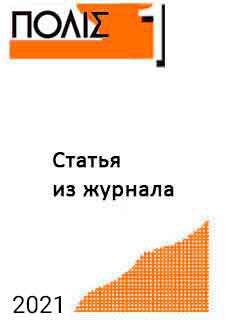Online shop of "Polis. Political Studies" Journal
We in the world, the world in us
Silaev N.Yu. А Test of Russian Geopolitics: Russia’s Foreign Policy in the Perspective of Geopolitical Theories. – Polis. Political Studies. 2021. No. 1. P. 125-141. (In Russ.).
150 руб.
geopolitical theories, Tsymbursky, Dugin, Russia’s foreign policy, balance of threats theory, international alliances, relations between Russia and the West.
The crisis in relations between Russia and the West has challenged not only Russia’s foreign policy but also the theories which explain Russia’s role in world politics. Historically, these theories have also pointed to the optimum political course for Moscow. Alexander Dugin’s geopolitics occupy a special place among those theories. Dugin is not recognized in academic circles in Russia, but in the West, Dugin is seen if not as a surrogate propounding the Kremlin’s views then as a rather influential political philosopher. His works are considered an important source of contemporary Russian foreign policy thought, and are used to explain Russian foreign policy. As a consequence, it is well worth assessing the degree to which Dugin’s approaches – and also the views of researchers who evaluate Russia’s foreign policy using his approach – have borne themselves out during this current crisis. In this paper, Dugin’s theory is tested by juxtaposing it against that of Vadim Tsymbursky, another geopolitical thinker well known in Russia but not in the West. Tsymbyrsky’s works were chosen because he has developed an original and holistic theory which explains the place Russia occupies in the world. The theory was built within the same geopolitical paradigm as Dugin’s, but contradicts the latter both with its point of departure and conclusions. Both Dugin’s and Tsymbursky’s theories are compared to the influential American realist Stephen Walt’s theory of the balance of threats. Western scholars pay particular attention to Dugin’s work, which holds Western academics back from developing a nuanced understanding of Russian domestic issues, the complexities thereof, and Russia’s place in the world. Furthermore, this hinders proper understanding of Russia’s foreign policy strategy. Russia’s behavior in the current crisis was more accurately predicted by Tsymbursky’s theory than by Dugin’s. The conclusions made regarding structural geographical factors in Russian’s foreign policy course – which are drawn according to Tsymbursky’s theory – indicate parallels with those which can be made on the basis of the balance of threats theory. As a paradigm, Russian geopolitics maintains its analytical potential, though it could be strengthened by a more thorough analysis of the current shifts in the international order.
 English
English Русский
Русский

Reviews
There are no reviews yet.